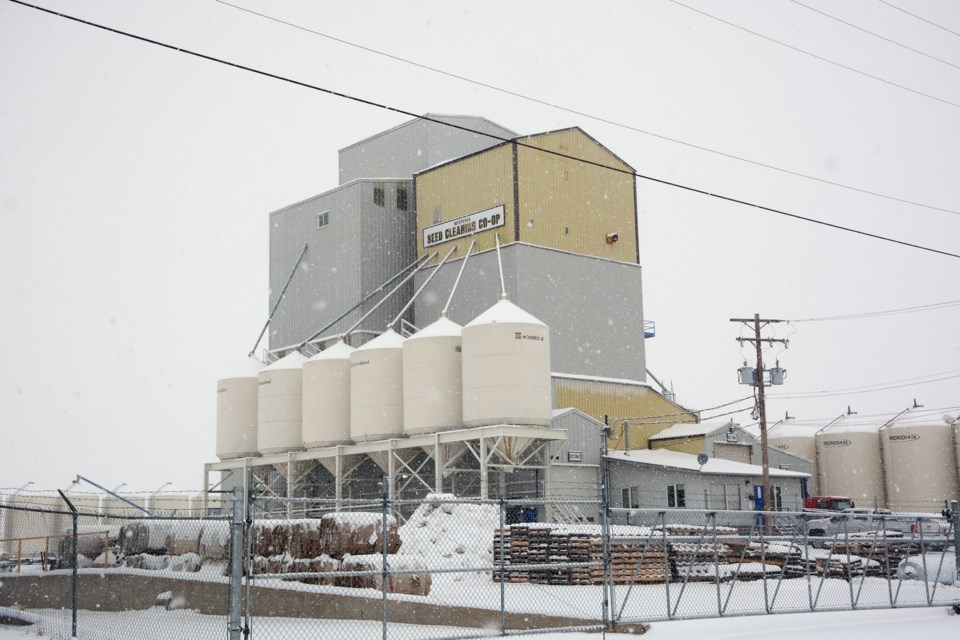Management scrambled and quickly were able to change to a virtual meeting the same evening and had 23 people join in on the Internet via Zoom.
Brian Trueblood chaired the meeting, which was broadcast from the David Felstad boardroom at Westlock Terminals office. Following the reading of the minutes of last year’s AGM, discussion of business arising from them, the auditor’s report and business arising from that, board chairman Colin Felstad gave his report. He began by thanking, on behalf of the board of directors, everyone for their continued patronage of the Co-op.
“The 2019-20 season once again produced a high-cleaning volume and high net income year. The board is extremely pleased with the Co-ops performance and returned $196,069 of patronage dividends to shareholders,” Felstad said.
“This past year we were fortunate to conclude a second land purchase adjacent to our existing lots. This purchase opens up the possibility of adding additional grower bins and provides space for an expanded cleaning footprint. It is a key priority of the board to advance planning and options for increasing our cleaning capacity.”
But there were multiple challenges to the 2019-20 cleaning season for staff and management. “Poor weather in spring and fall delayed and then compressed the cleaning season. Closing the office due to COVID-19 meant much extra work to accomplish routine business,” he said. “But through all this, both staff and management excelled and met our customers seed needs. We once again owe them a huge thank you for their exemplary work.”
Looking to the future, Felstad said the board will be evaluating options to grow the business and expand their cleaning capacity.
“The plant has operated near capacity the past few years and we feel there are excellent opportunities for growth yet. The business is on a strong financial footing, and most of our expansions thus far have been paid for in cash. The co-op continues to add more growers and expand the area into which seed is sold. These are signs of a healthy business which we aim to continue.”
In his report, Wayne Walker, who manages the Co-op, noted they had another exceptional year with a total volume of 1,907,806 bushels — 1,055,703 bushels (55.5 per cent pedigreed seed) 845,974 bushels (44.5 per cent) was common, or farm-saved seed, while only 6,129 bushels was done for dockage removal.
On a bit of a downside, he noted that due to another very wet spring, their treating numbers dropped to 269,121 bushels with an additional 15,716 bushels of Omex Primer added.
“Seed sales from producer bins in the yard was approximately 391,000 bushels and sales from in house bins while cleaning was approximately 139,000 bushels.”
Due to the volumes, Walker said planned and scheduled maintenance of the plant is carried out throughout the year with all major maintenance being done following spring seeding.
Regarding the two adjacent additional properties the co-op was able to purchase to the west of the existing plant, Walker pointed out new development is already underway, and additional shareholder bins are already in place. He said the warehouse that was on the south of the existing property was taken down and an additional bin yard has been developed.
“Much cost savings occurred for the plant as Wabash Manufacturing wanted the building and agreed to dismantle and clean the site for the cost of the building. We continue to work on policies and procedures for the booking, picking up and payment procedures for seed.”
Weather wise the warm fall led to good grain quality, although yields on average the poorest ever recorded.
“While seed supplies at the moment are comfortable, I encourage anyone looking to source new seed to do it sooner rather than later, as much of Northern Alberta has low seed stocks,” Walker added. “With fusarium being taken off the Pest Act, producer due diligence is more paramount than ever.”
Secretary Jackie Huppertz noted there was no re-organizational board meeting that evening, so a new chairman and other committee members will be named soon. Staying on the board are Colin Felstad, Theo Jonk, Kassidy Derewianko, Dave Montgomery and Paul Gerig. Newly elected are Steven Meinczinger and Ryan Kubinec. She also noted that with the resignation of Westlock County Coun. Fred Slobodian, who represented the municipality on the board, Dennis Primeau will take over.
Over the years, the Co-op has consistently been among the Top 10 plants in the province in various aspects. This past year they were third in grain processed, with 1,907,806 bushels. The plant was No. 2 in cleaning of pedigreed seed, just slightly behind the Taber plant, with 1,055,703 bushels cleaned, but in seed only, they were No. 1, with 1,901,677 bushels cleaned, and tops in seed treated, with a total of 284,837 bushels. The lowest rating was fourth for farm saved seed (common) with 845,974 bushels cleaned.



